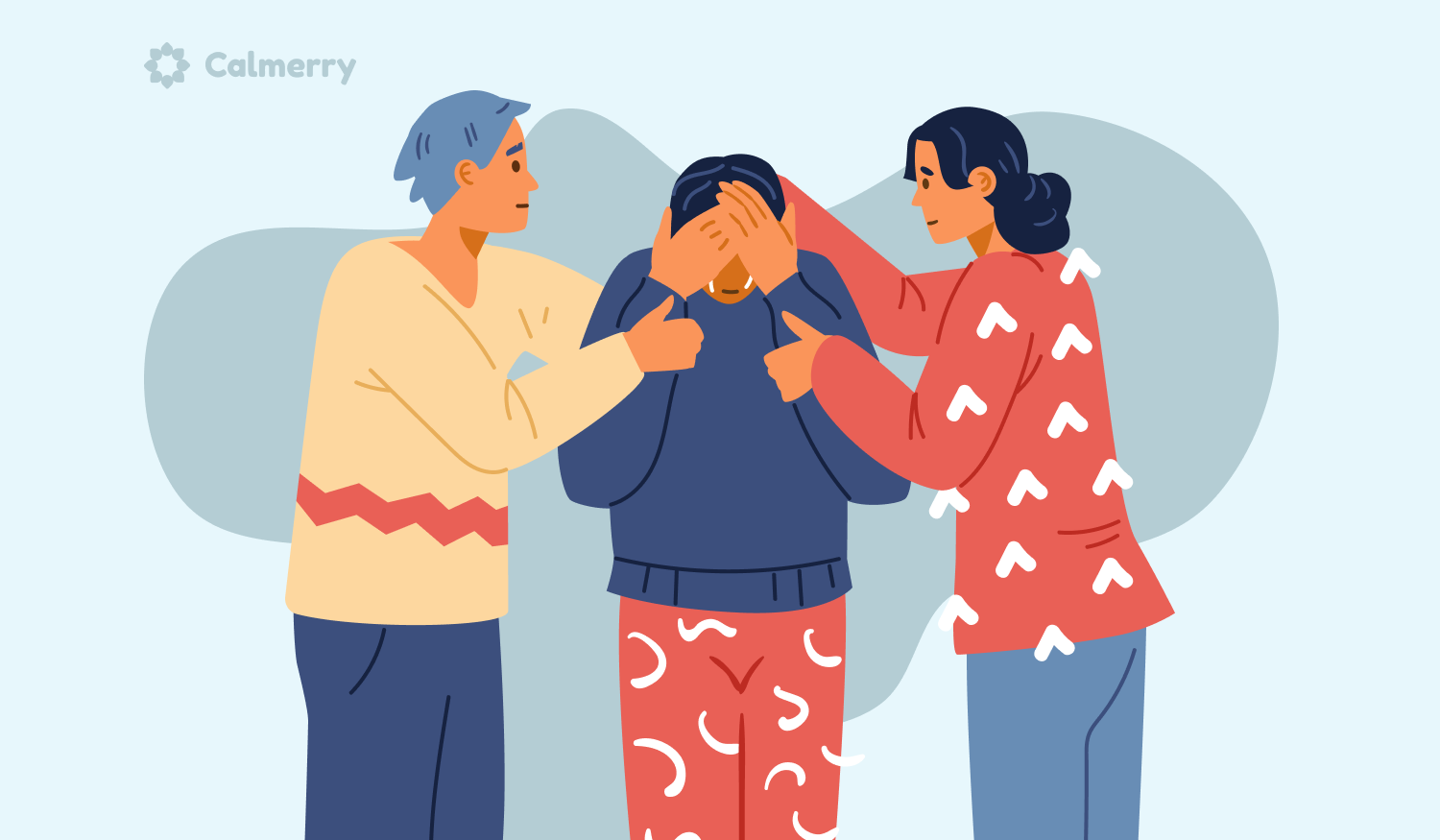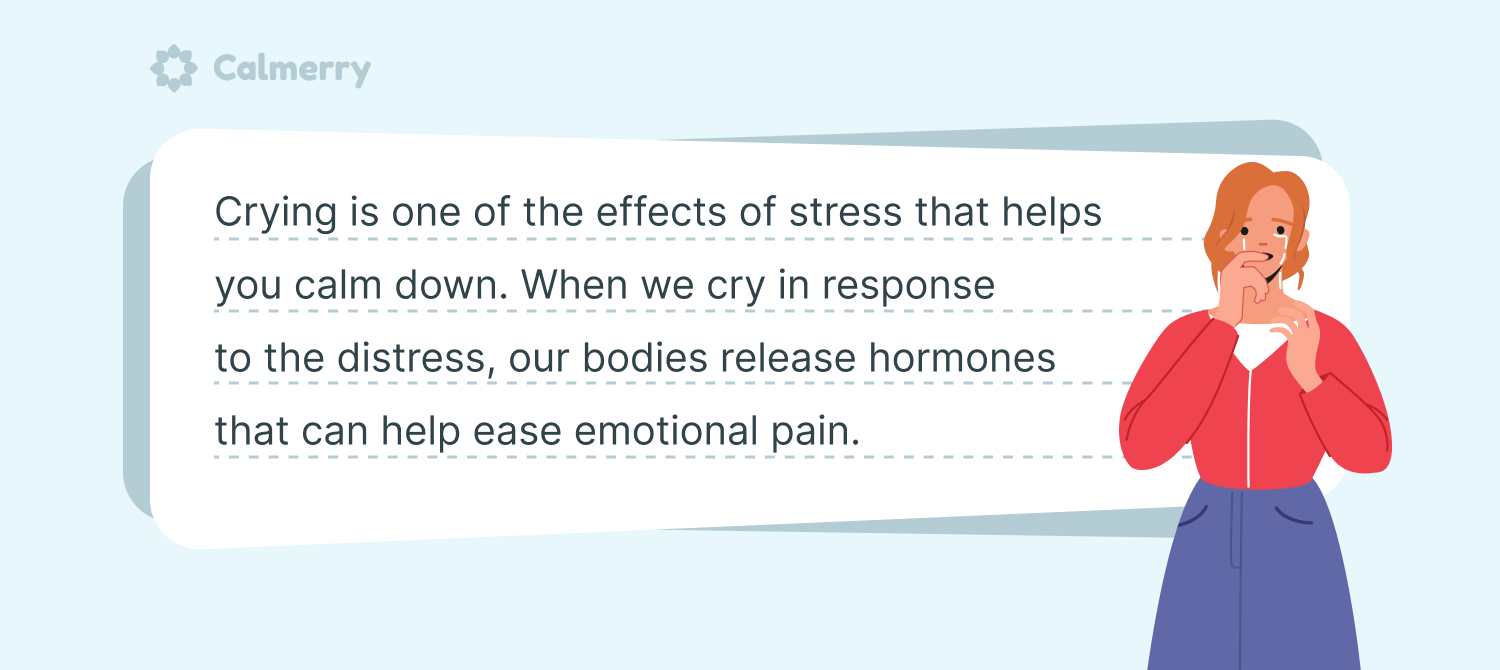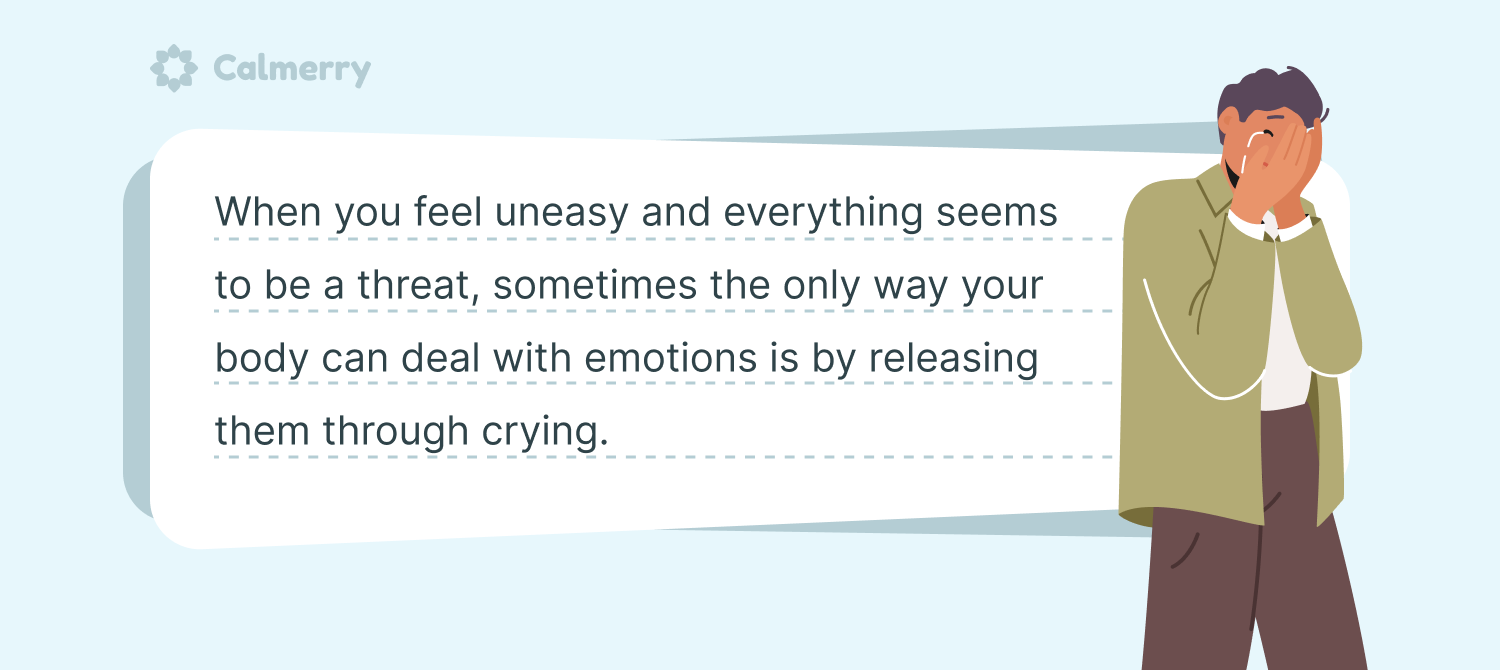Why Do I Cry for No Reason?

In this article
Even though crying is sometimes viewed as a negative reaction, it’s a common and healthy response to an upsetting or stressful situation, and you should never feel ashamed of expressing your emotions.
However, if you happen to cry uncontrollably, often without a cause, you have a right to feel concerned. In this article, you’ll learn about the role of crying and the signs it might be time to consider therapy.
Why do we cry, and is it normal to cry for no reason sometimes?
Crying is a strictly human phenomenon that is a response to a variety of situations. It’s not uncommon to feel tearful after watching a sad or heart-warming movie.
It’s also considered a self-soothing behavior, as crying is typically followed by a sense of relief. Whenever you’re hurt or upset and let the negative emotions out, you feel better afterward.
Additionally, crying is important because it facilitates social bonding by eliciting empathy and prosocial responses in others. Most people feel the need to help another person when they witness them cry. And it was noted that some cultures have engaged in group crying as a part of rituals that were meant to help them cope with a disaster or upcoming war.
Crying is also a way to be vulnerable, and sharing intimate details about yourself with other people allows you to build trust and develop a deeper connection.
As you can see, crying is a perfectly natural response that serves a purpose, whether it’s influencing the behavior of others or helping you get through a difficult time.
However, it’s also natural to question whether your behavior is normal or not because not many people realize that crying is more than just a sign of sadness.
For instance, some might believe that they’re tearful for no reason, while the explanation could be that they’ve had a stressful week or are under more pressure than usual.
Is it okay for men to cry? Absolutely!

If you’re a man, you might also wonder if your crying spells are something to be concerned about because expressing your emotions isn’t yet as normalized as it should be. Crying is often viewed as a weakness, especially in men who are seen as less sensitive than women and expected to display stereotypically masculine traits.
Thankfully, results from recent studies emphasize the importance of vulnerability for men and demonstrate that suppressing one’s emotions can have negative consequences.
For example, researchers who studied gender differences in how stress affects brain activity found out that men tend to withdraw socially when they’re distressed, while women seek support, which suggests that hiding how you feel can cause an inability to deal with negative emotions. This is a concerning conclusion that might also explain why the suicide rate is higher among men.
The good news is that the positive role of crying is becoming more and more recognized, even in cultures where it’s traditionally associated with shame.
For example, Japanese people are known for not showing too many emotions but some therapists now offer crying workshops that promote self-expression and teach participants about the healing power of tears.
Hopefully, crying will be more accepted and encouraged all over the world in the future. However, if you still feel like there’s no explanation for your crying spells, you’ll have to address the underlying issue.
Why do I want to cry for no reason?
We’ve already established that crying can be positive and is often a normal reaction to what’s going on in your life. But what does it mean when you cry for no reason?
If you cry, but there’s no trigger, it might be a response to an ongoing problem, often related to mental health. Here’s why you might feel like crying for no reason.
1. You’re grieving
Grief can be unpredictable. One day it might seem like you’re moving on, and the next day you might be dealing with unexpected crying spells at a grocery store.
The difficult emotions that are associated with grief can be complicated and might build up even if you aren’t consciously thinking about the upsetting event, which often leads to crying for “no reason.”
2. You’re burnt out
Crying episodes are one of the symptoms of burnout, which is defined as mental exhaustion that might lead to emotional numbness and detachment. When you’re overwhelmed, crying is your body’s way of dealing with being under too much pressure.
However, even though it’s normal, it’s also a sign that you aren’t coping with your current situation well. If you could use help with processing your emotions, you should consider talk therapy.

3. You might have a mental health disorder
One of the most common mental health disorders is depression. The symptoms might include feeling sad for no reason, lack of motivation, sleep problems, an inability to feel pleasure, changes in appetite, social withdrawal, and feeling more tearful than usual.
While some people might be emotionally numb due to depression, others might experience frequent mood swings, which can manifest themselves as crying for no reason.
Another issue that might explain crying for no reason is bipolar disorder, which is associated with extreme highs and lows in one’s mood. The two types of bipolar disorder are:
- Type I, which involves episodes of mania (an abnormally elevated mood) and depression;
- Type II features depression, too, but is associated with less severe manic episodes called hypomania.
In both cases, an individual with bipolar disorder might experience outbursts of emotions that include uncontrollable crying.
4. You’re feeling overwhelmed
Have you ever suddenly burst into tears when running errands even though you weren’t even feeling sad?
Crying is one of the effects of stress that promotes a feeling of calm. When we cry in response to distress, our bodies release feel-good hormones that can help ease emotional pain. But even though frequent crying might be beneficial, it’s also your body telling you that you need a break.
5. You’re experiencing hormonal changes
Many women experience crying spells before or on their period, most likely due to the drop in estrogen and progesterone which reduces the production of serotonin responsible for positive mood. This is often accompanied by irritability, increased anxiety, and a bad mood.
The symptoms might be even more intense if you have PMDD (premenstrual dysphoric disorder) which might present itself similarly to depression in the days leading up to a period.

Does anxiety cause crying?
If you have anxiety, you might want to cry frequently. Anxiety is a disorder associated with a sense of worry and distress that doesn’t go away even when stressors are removed.
Interestingly, while crying usually helps you decrease negative emotions, some studies link symptoms of anxiety to a worsened post-crying mood, possibly because individuals who cry to cope with distress might feel like they’re doing so for no reason.
This is especially relevant when it comes to generalized anxiety disorder, which causes you to worry about many aspects of your life even if the rational part of your brain tells you there’s nothing threatening about certain situations.
If you feel like crying has a negative influence on your well-being, you may want to check out signs it’s time to see a therapist.
When is crying a sign of a bigger issue?
Some people tend to be more emotional than others, and that’s okay. But if you’ve noticed that you cry more often than usual without an apparent cause, you should treat it as one of the warning signs and pay more attention to your well-being.
While it’s normal to experience frequent crying spells after an upsetting event such as a breakup or bereavement, if you sob without a trigger and can’t stop feeling down, it’s a sign that you might benefit from talking to a mental health professional.
It’s also important to understand whether or not frequent crying has a negative impact on your life. For example, breaking down during a work meeting or as a response to minor stress might make you feel embarrassed and sometimes impair your relationship with others.
Know when and where to get help
If you’re worried about your mental health, the best way to approach the issue is to opt for talk therapy. It has proven to be effective in treating many kinds of mental disorders, and it can improve the quality of your life.
For instance, if you’re dealing with depression, depression counseling can help you address the reasons behind your symptoms and improve your day-to-day functioning by learning effective coping skills.

If you’re not sure what causes your tears, you can take a depression test and then discuss the results with a licensed therapist. Therapy might help you understand your symptoms and learn effective stress management techniques. For example, practicing deep breathing or incorporating light physical activity in your schedule are effective ways to relieve stress.
It’s also a good idea to keep a mood journal where you can describe your symptoms and thoughts that lead to tears. This will allow you to identify your triggers, and it can be very helpful in preparation for your first therapy session.
online therapy
live video session


